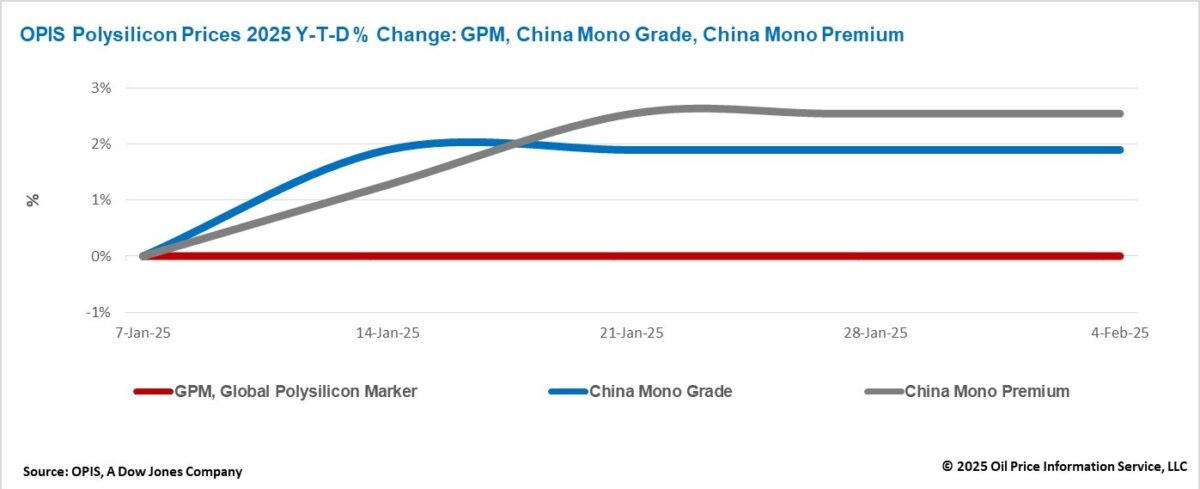The Global Polysilicon Marker (GPM), the OPIS benchmark for polysilicon outside China, was assessed at $20.360/kg, or $0.046/W this week, unchanged from the previous week on the back of unchanged market fundamentals.
The global polysilicon market remains subdued, with no significant shifts in supply or demand. Wafer production rates in Southeast Asia, the primary import market, show no signs of growth, and uncertainty surrounding international trade policies further suggests that a short-term recovery in global polysilicon demand is unlikely.
The stakeholders in this market are closely watching for potential U.S. trade policies that may favor non-Chinese products, thereby bolstering global polysilicon demand, as the profitability of global polysilicon manufacturers is intricately linked to the evolving landscape of international trade policies.
This trend is gradually unfolding. On February 1, U.S. President Donald Trump announced a 10% tariff increase on all exports from China, set to take effect on February 4. This policy covers solar products across the entire supply chain. While it does not directly drive demand for global polysilicon, it signals an increasing restriction on products containing Chinese content, which could ultimately support global polysilicon demand.
The China Mono Grade, OPIS’ assessment for mono-grade polysilicon prices within the country, remained stable this week at CNY 33.625 ($4.61)/kg, equivalent to CNY 0.076/W. Similarly, the China Mono Premium, OPIS’ price assessment for mono-grade polysilicon used in n-type ingot production, held steady at CNY 40.375/kg, or CNY 0.091/W. Both prices remained unchanged from the previous week due to the closure of the Chinese market for the Lunar New Year holiday.
In January, the China Mono Premium price rose for three consecutive weeks ahead of the Lunar New Year holiday, with market discussions focusing on two key concerns: the duration of low operating rates among polysilicon producers and the sustainability of the price rebound observed before the holiday.
Most Chinese polysilicon producers continued to operate at reduced rates. Aside from an FBR granular polysilicon manufacturer, which maintained a 70% operating rate due to relatively low inventory pressure, Siemens polysilicon manufacturers operated at an average rate of 30% to 40%.
However, some market participants cautioned that the recent price rebound might create misleading signals, potentially prompting manufacturers to ramp up production prematurely, which could shorten the duration of the price recovery.
According to data from the China Nonferrous Metals Industry Association (CSIA), China’s polysilicon imports totaled 39,800 MT in 2024, while exports reached 40,000 MT, marking the first time in history that exports have exceeded imports. This growth in polysilicon exports was reportedly partly driven by the continued entry of certain modules, made from traceability-compliant Chinese polysilicon, into the U.S. market.
If this trade flow continues, industry participants anticipate that China’s polysilicon exports will continue to grow over the next two years, particularly as new wafer production capacity is announced in regions such as India, Indonesia, and the Middle East.
OPIS, a Dow Jones company, provides energy prices, news, data, and analysis on gasoline, diesel, jet fuel, LPG/NGL, coal, metals, and chemicals, as well as renewable fuels and environmental commodities. It acquired pricing data assets from Singapore Solar Exchange in 2022 and now publishes the OPIS APAC Solar Weekly Report.
The views and opinions expressed in this article are the author’s own, and do not necessarily reflect those held by pv magazine.
This content is protected by copyright and may not be reused. If you want to cooperate with us and would like to reuse some of our content, please contact: editors@pv-magazine.com.








1 comment
By submitting this form you agree to pv magazine using your data for the purposes of publishing your comment.
Your personal data will only be disclosed or otherwise transmitted to third parties for the purposes of spam filtering or if this is necessary for technical maintenance of the website. Any other transfer to third parties will not take place unless this is justified on the basis of applicable data protection regulations or if pv magazine is legally obliged to do so.
You may revoke this consent at any time with effect for the future, in which case your personal data will be deleted immediately. Otherwise, your data will be deleted if pv magazine has processed your request or the purpose of data storage is fulfilled.
Further information on data privacy can be found in our Data Protection Policy.